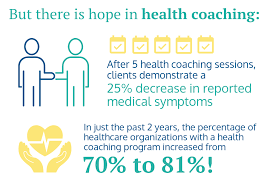Erica Nelson, MSPH, NBC-HWC

The legendary basketball coach, John Wooden once said, “A good coach can change a game. A great coach can change a life.” At Carolina Total Wellness, our coaches help our patients change their lives every day.Every patient at Carolina Total Wellness that sees a doctor or physician assistant is paired with a health coach. Some patients may also choose to work solely with a health coach to achieve their dietary and lifestyle goals. This article will help you know what to expect when you work with a health coach.
Here are 3 key aspects of the health coaching experience at Carolina Total Wellness:
The Space Between
Health coaches hold space for you to pause… and decide how you want to respond to your circumstances. The world today is a seemingly relentless onslaught of stimulation, and it can feel like there is an urgency to react to all of that stimulation.
George Mumford, meditation coach to Michael Jordan, LeBron James, Kobe Bryant and other world-class athletes offers another way, ‘Think about the eye of a hurricane.’ He says, ‘No matter how intense the storm or what’s swept up in its gale-force winds, that calm, blue center is always there. We all have this quiet center within us.’ Your CTW coach will help you respond from that quiet center within, rather than reacting from the chaos of the storm.
In our office, health coaches hold space for you to make sense of what is going on in your world and in your body and decide how you want to respond. Health coaches always honor the fact that you are the expert on your own life and display unconditional positive regard for you and whatever lifestyle decisions you choose. They pay attention to what matters to you and may offer suggestions for adjustments that fit into your life.
Translator
The science of the body and its systems are the physician’s expertise. Science of behavior change is the coach’s expertise. Our coaches help you translate medical science you discuss with your doctor or PA into evidence-based behavioral change strategies to optimize your health. When you combine the medical knowledge of our physicians and PA with your coach’s expertise in the science of motivation, habits, and change, many of the barriers to experiencing health fall away.
Each of the coaches at CTW has at least a bachelor’s degree from an accredited university and training in coaching from either the Functional Medicine Coaching Academy or Duke University. Some of them also have master’s degrees and other specialized training in nutrition, exercise, counseling, and other relevant fields. Unless otherwise specified, CTW coaches are not registered dietitians, licensed mental health professionals or certified fitness professionals.
Guide
In the words of Michael Jordan, ‘A coach is someone that sees beyond your limits and guides you to greatness!’ CTW coaches come to the table with empathy for whatever you are facing and feeling and confidence in your ability to overcome. Each coach has faced their own struggles in life and knows what it is like to work hard to overcome. However, coaches never replace you as the expert on you; they serve as your guide on your journey to health. Coaches can help you understand all the different ways you can try intermittent fasting or yoga or what, exactly, is ‘glycemic index.’ Maybe our most important job, though, is to help you get very clear on your vision of the healthiest version of you. Once you decide where it is you want to go, coaches provide education, support and accountability to knock down any stumbling blocks that may come up along the way.
Call us today to schedule your appointment with one of our health coaches.

Erica Nelson, MSPH, NBC-HWC



















